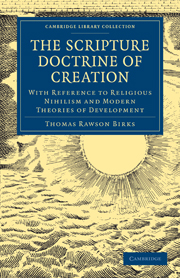 The Scripture Doctrine of Creation
The Scripture Doctrine of Creation Book contents
- Frontmatter
- Contents
- INTRODUCTION
- CHAPTER I ON RELIGIOUS NIHILISM
- CHAPTER II ON RELIGIOUS NIHILISM (continued)
- CHAPTER III THE ALLEGED LAW OF SCIENTIFIC PROGRESS
- CHAPTER IV THE BEGINNING
- CHAPTER V THE CREATION OF MATTER
- CHAPTER VI ON INFINITE SPACE
- CHAPTER VII ON FORCE, LAW, AND NECESSITY
- CHAPTER VIII ON CREATION AND LIFE
- CHAPTER IX ON CREATION AND EVOLUTION
- CHAPTER X EVOLUTION AS AN INDUCTIVE THEORY
- CHAPTER XI ON CREATION BY LAW
- CONCLUSION
CHAPTER III - THE ALLEGED LAW OF SCIENTIFIC PROGRESS
Published online by Cambridge University Press: 29 August 2010
- Frontmatter
- Contents
- INTRODUCTION
- CHAPTER I ON RELIGIOUS NIHILISM
- CHAPTER II ON RELIGIOUS NIHILISM (continued)
- CHAPTER III THE ALLEGED LAW OF SCIENTIFIC PROGRESS
- CHAPTER IV THE BEGINNING
- CHAPTER V THE CREATION OF MATTER
- CHAPTER VI ON INFINITE SPACE
- CHAPTER VII ON FORCE, LAW, AND NECESSITY
- CHAPTER VIII ON CREATION AND LIFE
- CHAPTER IX ON CREATION AND EVOLUTION
- CHAPTER X EVOLUTION AS AN INDUCTIVE THEORY
- CHAPTER XI ON CREATION BY LAW
- CONCLUSION
Summary
One main argument in favour of Religious Nihilism, or the doctrine that Theology is a wholly barren and impossible science, is drawn from M. Comte's famous law of scientific progress. Every science, it is affirmed, tends to pass on to its full perfection by three stages, the Theological, the Metaphysical, and the Positive. In the first stage, natural phenomena are referred to deities, or supernatural powers; in the second to entities, or metaphysical abstractions, such as cause, force, substance, vital power. But, in the third and last stage; Science outgrows the swaddling clothes of metaphysics and theology, and confines itself to the classification of phenomena, and to that alone. It groups these together by a cautious induction, and thus detects laws of their recurrence, which may serve for the guidance of our daily life.
Such a law, when made the basis of a scheme of philosophy, should rest either on a very wide collection of historical facts, or else on some proved necessity in the nature of human thought. But an induction, which should analyze the course of every science from the earliest ages, not only in its actual advance, but in the mental conceptions of its students, and the methods used in its discoveries, reducing the action of ten thousand minds, for thousands of years, on twenty different subjects, to one general law, is too wide and vast for any human mind to undertake with success.
- Type
- Chapter
- Information
- The Scripture Doctrine of CreationWith Reference to Religious Nihilism and Modern Theories of Development, pp. 50 - 77Publisher: Cambridge University PressPrint publication year: 2009First published in: 1872
